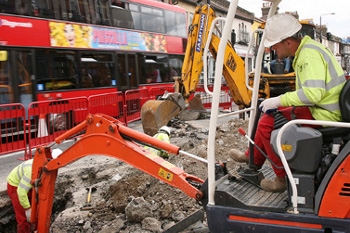The Department for Transport (DfT) is currently formulating options on a possible expansion of highways lane rental schemes, following successful results from London and Kent.
Lane rental schemes attempt to reduce congestion by charging work promoters, such as utilities, up to £2,500 for working on the network during daytime hours – often resulting in more schemes taking place at night.

Lane rental can mean more works are carried out at night
Authorities must obtain approval from the transport secretary to operate a lane rental scheme, whereas permit schemes - which provide highway authorities with more scope to coordinate works and charge a fee for permit applications - no longer require the approval of the secretary of state following the Deregulation Act (2015).
Confirmation from DfT that lane rental options are being considered has prompted speculation that ministers could be planning some form of devolution on lane rental schemes to remove the need for authorities to have to apply for the powers.
A senior source at the Local Government Association told Transport Network this move would be welcomed by local government.
‘It [lane rental] should be open to everyone,’ the source said.
Another senior local government highways source suggested that lane rental or permit schemes could be used across the new generation of combined authorities, which had benefited from recent devolution deals, covering the Key Route Networks developed across their conurbations.
London and Kent trials
The Government gave approval to Transport for London (TfL) and Kent County Council to trial ‘pioneer’ lane rental schemes in 2012 and 2013 respectively.
A positive update report on the trials, released last December by Ecorys, is thought to have influenced ministers to consider options. Transport Network understands a consultation could be released next year on any proposals.
TfL estimates the overall benefit of its lane rental scheme to be around £30m per annum, with the scheme costing around £1.5m a year to run and bringing in around £3m a year in direct charges, which range from £800 to £2,500.
Kent charges from £300 to £2,000 a day on its scheme, which covers just 5% of its network and costs £400,000 a year to run.
In London, where the scheme now covers around 56% of the network, the report found: ‘The total serious and severe disruption associated with planned works fell by 42% in TLRS areas compared to a 2% reduction in non-TLRS areas, (again) suggesting a positive impact due to lane rental.’
The report states: ‘Authorities feel that lane rental complements and adds to their existing permit schemes giving them additional levers with which to influence behaviour, although promoters tend to argue that the introduction of lane rental has just served to add an extra layer of administration and has not significantly influenced their behaviour compared to permits alone.
‘Overall, it appears that lane rental has helped to reinforce and encourage behavioural change but that it is only one of several factors and that internal drivers (such as the need to reduce costs and improve customer service) and the influence of the regulator are also important factors which are perceived to have already led to promoters exploring new ways of working and investing in innovation.’

Lane rental in London has reduced congestion and increased revenues
Permit first?
It also states that in the view of the authorities, 'permitting is a necessary precondition of being able to administer a lane rental scheme'.
This raises the question of whether lane rental could be taken on by local authorities that did not already having permitting powers.
In a previous DfT consultation on removing unmanned road works at weekends, officials rejected the idea of mandatory permit schemes across local government as 'disproportionate' and against localism, suggesting that any lane rental roll-out might be targeted at permitting authorities.
A source at Kent CC said it would be useful to be a permitting authority because, as opposed to normal noticing authorities, the council could set conditions on works.
They added that lane rental may not be appropriate for every area and suggested councils might wish to carry out a review of the local network to find which roads it would apply best to.
Warnings
The Ecorys report also warns that: ‘Some promoters have been incentivised to delay non-urgent planned maintenance work to their assets where this would be liable for a lane rental charge. This may have the perverse effect of creating a higher number of emergency works due to poorly maintained infrastructure.’
It adds: ‘Lane rental leads to an increase in costs to promoters and ultimately to utility customers and council tax payers, which reflects the rental value of accessing public assets.’
Night-time working also carries extra costs. One promoter estimated that the contractor costs were subject to a 50% uplift and another reported having paid an additional £500 to ensure access to reinstatement materials outside of normal working hours.
The report recommends that the DfT consider whether future schemes ‘should allow for pro-rata charging to allow short duration projects to be undertaken without being charged for a whole day. Some promoters reported that the current structure of charging does not maximise the incentive for them to clear a site as quickly as possible’.
Register now for full access
Register just once to get unrestricted, real-time coverage of the issues and challenges facing UK transport and highways engineers.
Full website content includes the latest news, exclusive commentary from leading industry figures and detailed topical analysis of the highways, transportation, environment and place-shaping sectors.
Use the link below to register your details for full, free access.
Already a registered? Login